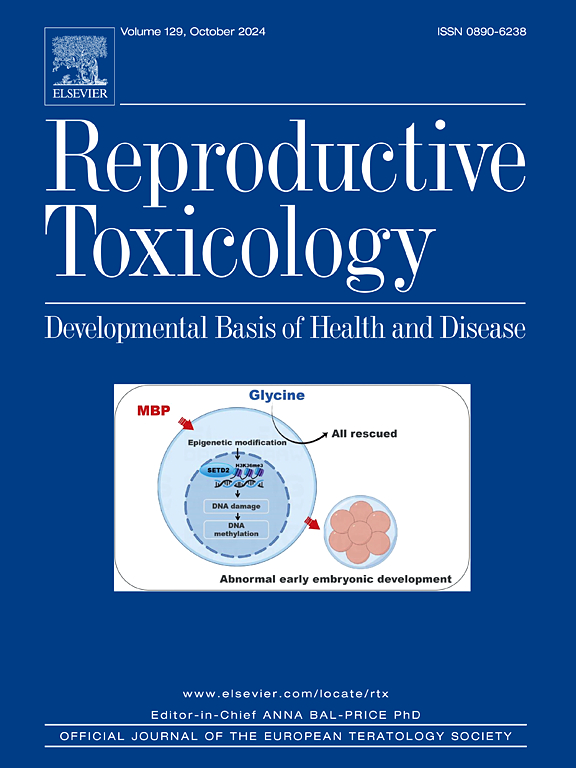Use of serotonin reuptake inhibitors (SSRIs) and serotonin and norepinephrine reuptake inhibitors (SNRIs) during pregnancy: Effect on fetal growth and long-term reproductive outcomes
IF 2.8
4区 医学
Q2 REPRODUCTIVE BIOLOGY
引用次数: 0
Abstract
Anxiety and depression during pregnancy are recognized as major public health concerns. Depression and anxiety, if untreated, severely affect both mother and the fetus, especially during pregnancy. Selective serotonin reuptake inhibitors (SSRIs) and serotonin-norepinephrine reuptake inhibitors (SNRIs) are frequently prescribed drugs to manage above conditions during pregnancy. Although these medications affect the levels of neurotransmitters, research indicates their potential impact on development of the fetus. Studies on maternal exposure to SSRIs and SNRIs show possible risks of offspring's congenital cardiovascular abnormalities and anomalies of the kidney and digestive system. Maternal exposure to selective SSRIs and SNRIs during pregnancy has been associated with certain adverse perinatal outcomes, including preterm birth, low birth weight, and neonatal adaptation syndrome. Exposure to SSRIs and SNRIs also increases the possible risk of persistent pulmonary hypertension in the newborn. However, evidence regarding long-term neurodevelopmental outcomes remains inconclusive, with studies showing mixed results. Therefore, based on the available data, it is hypothesized that these drugs may potentially have direct or indirect effects on reproductive outcomes of the progeny. Because of the increasing occurrence of maternal depression worldwide and the consequent usage of SSRIs and SNRIs, there is an urgent need for additional data to better understand the risk of developmental toxicity related to the use of these antidepressants during pregnancy. This review, therefore, aims to examine the effects of SSRIs and SNRIs exposure during pregnancy on fetal growth, postnatal development and long-term reproductive outcomes of the progeny with regard to a careful consideration of better treatment options.
妊娠期间使用血清素再摄取抑制剂(SSRIs)和血清素和去甲肾上腺素再摄取抑制剂(SNRIs):对胎儿生长和长期生殖结局的影响
怀孕期间的焦虑和抑郁被认为是主要的公共卫生问题。抑郁和焦虑,如果不治疗,严重影响母亲和胎儿,特别是在怀孕期间。选择性5 -羟色胺再摄取抑制剂(SSRIs)和5 -羟色胺-去甲肾上腺素再摄取抑制剂(SNRIs)是治疗妊娠期间上述情况的常用处方药。虽然这些药物会影响神经递质的水平,但研究表明它们对胎儿发育的潜在影响。对母体接触SSRIs和SNRIs的研究显示,可能存在子代先天性心血管异常、肾脏和消化系统异常的风险。孕妇在怀孕期间暴露于选择性SSRIs和SNRIs与某些不良围产期结局相关,包括早产、低出生体重和新生儿适应综合征。暴露于SSRIs和SNRIs也可能增加新生儿持续性肺动脉高压的风险。然而,关于长期神经发育结果的证据仍然不确定,研究显示的结果好坏参半。因此,根据现有的数据,假设这些药物可能对后代的生殖结果有直接或间接的影响。由于全球范围内孕产妇抑郁症发生率的增加以及随之而来的SSRIs和SNRIs的使用,迫切需要更多的数据来更好地了解与妊娠期间使用这些抗抑郁药相关的发育毒性风险。因此,本综述旨在研究妊娠期间SSRIs和SNRIs暴露对胎儿生长、产后发育和后代长期生殖结局的影响,并仔细考虑更好的治疗方案。
本文章由计算机程序翻译,如有差异,请以英文原文为准。
求助全文
约1分钟内获得全文
求助全文
来源期刊

Reproductive toxicology
生物-毒理学
CiteScore
6.50
自引率
3.00%
发文量
131
审稿时长
45 days
期刊介绍:
Drawing from a large number of disciplines, Reproductive Toxicology publishes timely, original research on the influence of chemical and physical agents on reproduction. Written by and for obstetricians, pediatricians, embryologists, teratologists, geneticists, toxicologists, andrologists, and others interested in detecting potential reproductive hazards, the journal is a forum for communication among researchers and practitioners. Articles focus on the application of in vitro, animal and clinical research to the practice of clinical medicine.
All aspects of reproduction are within the scope of Reproductive Toxicology, including the formation and maturation of male and female gametes, sexual function, the events surrounding the fusion of gametes and the development of the fertilized ovum, nourishment and transport of the conceptus within the genital tract, implantation, embryogenesis, intrauterine growth, placentation and placental function, parturition, lactation and neonatal survival. Adverse reproductive effects in males will be considered as significant as adverse effects occurring in females. To provide a balanced presentation of approaches, equal emphasis will be given to clinical and animal or in vitro work. Typical end points that will be studied by contributors include infertility, sexual dysfunction, spontaneous abortion, malformations, abnormal histogenesis, stillbirth, intrauterine growth retardation, prematurity, behavioral abnormalities, and perinatal mortality.
 求助内容:
求助内容: 应助结果提醒方式:
应助结果提醒方式:


